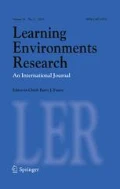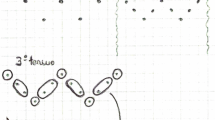Abstract
For the purpose of examining a tool to enable students in higher education to systematically reflect on their own self-regulation, a modified version of the Martinez-Pons Scale of Self-Regulation was used in a cohort study of 75 first-year undergraduate students in a Scottish University. Statistical analyses of the data revealed that, consequent to the intervention, participants reported greater use of self-regulatory behaviour. The reported change is explored through the lenses of expertise, pedagogy and personal epistemology. While this study cannot explain the detail of this reported change, its purpose was nevertheless met insofar as a structured self-recording instrument, to focus and inform students on the nature and effectiveness of their current learning behaviour, could be a useful and readily-available pedagogic tool for higher education tutors who wish some support in their practice.
Similar content being viewed by others
References
Bandura, A. (1997). Self-efficacy: The exercise of control. New York: Freeman.
Biggs, J. (1993). What do inventories of students' learning processes really measure? British Journal of Educational Psychology, 63, 3–19.
Boekaerts, M. (1997). Self-regulated learning: A new concept embraced by researchers, policy makers, educators, teachers and students. Learning and Instruction, 7, 161–186.
Boekaerts, M. (1999). Self-regulated learning: Where we are today. International Journal of Educational Research, 31, 445–457.
Boekaerts, M., & Minnaert, A. (1999). Self-regulation with respect to informal learning. International Journal of Educational Research, 31, 533–544.
Boekaerts, M., Pintrich, P., & Zeidner, M. (Eds.). (2000). Handbook of self-regulation. San Diego, CA: Academic Press.
Brophy, J. (2002). Social constructivist teaching: Affordances and constraints. Oxford, UK: Elsevier Science Ltd.
Butler, D., & Winne, P. (1995). Feedback and self-regulated learning: A theoretical synthesis. Review of Educational Research, 65, 245–281.
Collins, A., Brown, J., & Newman, S. (1989). Cognitive apprenticeship: Teaching the crafts of reading, writing and mathematics. In L. Resnick (Ed.), Knowing, learning and instruction (pp. 453–494). Hillsdale, NJ: Lawrence Erlbaum Associates.
Cramer, D. (1998). Fundamental statistics for social research. London: Routledge.
Dahlgren, L. (1997). Learning conceptions and outcomes. In F. Marton, D. Hounsell, & N. Entwistle (Eds.), The experience of learning (pp. 23–38). Edinburgh, Scotland: Scottish Academic Press.
Eraut, M. (1994). Developing professional knowledge and competence. London: Falmer Press.
Ericsson, K. (2002). Attaining excellence through deliberate practice. In C. Desforges & R. Fox (Eds.), Teaching and learning: The essential readings (pp. 4–37). London: Blackwell
Ertmer, P., & Newby, T. (1996). The expert learner: Strategic, self-regulated, and reflective. Instructional Science, 24, 1–24.
Fiske, S., & Taylor, S. (1991). Social cognition. New York: McGraw-Hill.
Gagné, R. (1970). The conditions of learning. New York: Holt, Rinehart & Winston.
Garcia, T., & Pintrich, P. (1994). Regulating motivation and cognition in the classroom: The role of self-schemas and self-regulatory strategies. In D. Schunk & B. Zimmerman (Eds.), Self-regulation of learning and performance (pp. 127–153). Hillsdale, NJ: Lawrence Erlbaum Associates.
Glaser, R. (1991). The maturing of the relationship between the science of learning and cognition and educational practice. Learning and Instruction, 1, 129–144.
Glaser, R., & Chi, M. (1988). Overview. In M. Chi, R. Glaser, & M. Farr (Eds.), The nature of expertise (pp. xv–xxvii). Hillsdale, NJ: Erlbaum.
Hickey, D., & McCaslin, M. (2001). A comparative, sociocultural analysis of context and motivation. In S. Volet & S. Järvelä (Eds.), Motivation in learning contexts (pp. 33–55). London: Pergamon.
Järvelä, S., & Niemivirta, M. (1999). The changes in learning theory and the topicality of the recent research on motivation. Research Dialogue in Learning and Instruction, 1, 57–65.
Locke, E., & Latham, G. (1990). A theory of goal setting and task performance. Englewood Cliffs, NJ: Prentice-Hall.
Martinez-Pons, M. (2000, June). Effective transfer as a self-regulatory process: Implications for adult education. Paper presented at the Royaumont Symposium on Self-Learning, Paris.
Martinez-Pons, M. (2001).The psychology of teaching and learning. London: Continuum.
Oettingen, G., Hænig, G., & Gollwitzer, P. (2000). Effective self-regulation of goal attainment. International Journal of Educational Research, 33, 705–732.
Pintrich, P. (2000). The role of goal orientation in self-regulated learning. In M. Boekaerts, P. Pintrich, & M. Zeidner (Eds.), Handbook of self-regulation (pp. 451–502). San Diego, CA: Academic Press.
Pintrich, P. (2003). Multiple goals and multiple pathways in the development of motivation and self-regulated learning. In L. Smith, C. Rogers, & P. Tomlinson (Eds.), Development and motivation (BJEP Monograph Series, 2(2), pp. 137–153). Leicester, UK: The British Psychological Society.
Pintrich, P. (2004). A conceptual framework for assessing motivation and self-regulated learning in college students. Educational Psychology Review, 16, 385–407.
Pintrich, P., & DeGroot, E. (1990). Motivational and self-regulated learning components of classroom academic performance. Journal of Educational Psychology, 82, 33–40.
Pintrich, P., Smith, D., Garcia, T., & McKeachie, W. (1993). Reliability and predictive validity of the motivated strategies for learning questionnaire (MSLQ). Educational and Psychological Measurement, 53, 801–813.
Pintrich, P., Wolters, C., & Baxter, G. (2000). Assessing metacognition and self-regulated learning. In G. Schraw & J. Impara (Eds.), Issues in the measurement of metacognition (pp. 44–97). Lincoln, NE: Buros Institute of Mental Measurement.
Resnick, L. (1989). (Ed.). Knowing, learning and instruction. Hillsdale, NJ: Lawrence Erlbaum Associates.
Richardson, J. (2004). Methodological issues in questionnaire-based research on student learning in higher education. Educational Psychology Review, 16, 347–358.
Schommer, M. (1993). Epistemological development and academic performance among secondary students. Journal of Educational Psychology, 85, 406–411.
Shuell, T. (1986). Cognitive conceptions of learning. Review of Educational Research, 56, 411–436.
Shuell, T. (1996). Teaching and learning in a classroom context. In D. Berliner & R. Calfee (Eds.), Handbook of educational psychology (pp. 726–764). London: Macmillan.
Shulman, L. (1987). Knowledge and teaching: Foundations of the new reform. Harvard Educational Review, 57, 1–22.
Tobias, S., & Everson, H. (2000). Assessing metacognitive knowledge monitoring. In G. Schraw & J. Impara (Eds.), Issues in the measurement of metacognition (pp. 147–222). Lincoln, NE: Buros Institute of Mental Measurement.
Tynjälä, P. (1999). Towards expert knowledge? A comparison between a constructivist and a traditional learning environment in the university. International Journal of Educational Research, 31, 357–442
Veenman, M., Kok, R., & Blötte, A. (2005). The relation between intellectual and metacognitive skills in early adolescence. Instructional Science, 33, 193–211.
Vermunt, J. (1995). Process-oriented instruction in learning and thinking skills. European Journal of Psychology of Education, 10, 325–349.
Vermunt, J., & Verloop, N. (1999). Congruence and friction between learning and teaching. Learning and Instruction, 9, 257–280.
Weinstein, C., Zimmerman, S., & Palmer, D. (1988). Assessing learning strategies: The design and development of the LASSI. In C. Weinstein (Ed.), Learning and study strategies: Issues in assessment, instruction and evaluation (pp. 25–40). London: Academic Press.
Winne, P. (1995). Inherent details in self-regulated learning. Educational Psychologist, 30, 173–187.
Winne, P. (1997). Experimenting to bootstrap self-regulated learning. Journal of Educational Psychology, 89, 397–410.
Winne, P., Jamieson-Noel, D., & Muis, K. (2002). Methodological issues and advances in researching tactics, strategies and self-regulated learning. In P. Pintrich & M. Maer (Eds.), Advances in motivation and achievement: Vol. 12 New directions in measures and methods (pp. 121–155). Amsterdam: Elsevier Press
Winne, P., & Perry, N. (2000). Measuring self-regulated learning. In M. Boekaerts, P. Pintrich, & M. Zeidner (Eds.), Handbook of self-regulation (pp. 531–566). San Diego, CA: Academic Press.
Wosnitza, M., & Nenniger P. (2001). Perceived learning environments and the individual learning process. In S. Volet & S. Järvelä (Eds.), Motivation in learning contexts(pp. 171–187). London: Pergamon.
Zeidner, M., Boekaerts, M., & Pintrich, P. (2000). Self-regulation: Directions and challenges for future research. In M. Boekaerts, P. Pintrich, & M. Zeidner (Eds.), Handbook of self-regulation (pp. 749–768). San Diego, CA: Academic Press.
Zimmerman, B. (1994). Dimensions of academic self-regulation: A conceptual framework for education. In D. Schunk & B. Zimmerman (Eds.), Self-regulation of learning and performance (pp. 3–21). Hillsdale, NJ: Lawrence Erlbaum Associates.
Zimmerman, B. (1998). Developing self-fulfilling cycles of academic regulation. In D. Schunk & B. Zimmerman (Eds.), Self-regulated learning (pp. 1–19). London: The Guildford Press.
Zimmerman, B. (1999). Commentary: Toward a cyclically interactive view of self-regulated learning. International Journal of Educational Research, 31, 545–551.
Zimmerman, B. (2000). Attaining self-regulation. In M. Boekaerts, P. Pintrich, & M. Zeidner (Eds.), Handbook of self-regulation (pp. 13–39). San Diego, CA: Academic Press.
Zimmerman, B. (2001). Theories of self-regulated learning and academic achievement. In B. Zimmerman & D.Schunk (Eds.), Self-regulated learning and academic achievement (pp. 1–37). Mahwah, NJ: Lawrence Erlbaum Associates.
Zimmerman, B., & Risemberg, R. (1997). Caveats and recommendations about self-regulation of writing: A social cognitive rejoinder. Contemporary Educational Psychology, 22, 115–122.
Zimmerman, B., & Schunk, D. (Eds.). (2001). Self-regulated learning and academic achievement. Mahwah, NJ: Lawrence Erlbaum Associates.
Author information
Authors and Affiliations
Rights and permissions
About this article
Cite this article
Maclellan, E., Soden, R. Facilitating Self-Regulation in Higher Education Through Self-Report. Learning Environ Res 9, 95–110 (2006). https://doi.org/10.1007/s10984-005-9002-4
Received:
Accepted:
Published:
Issue Date:
DOI: https://doi.org/10.1007/s10984-005-9002-4




